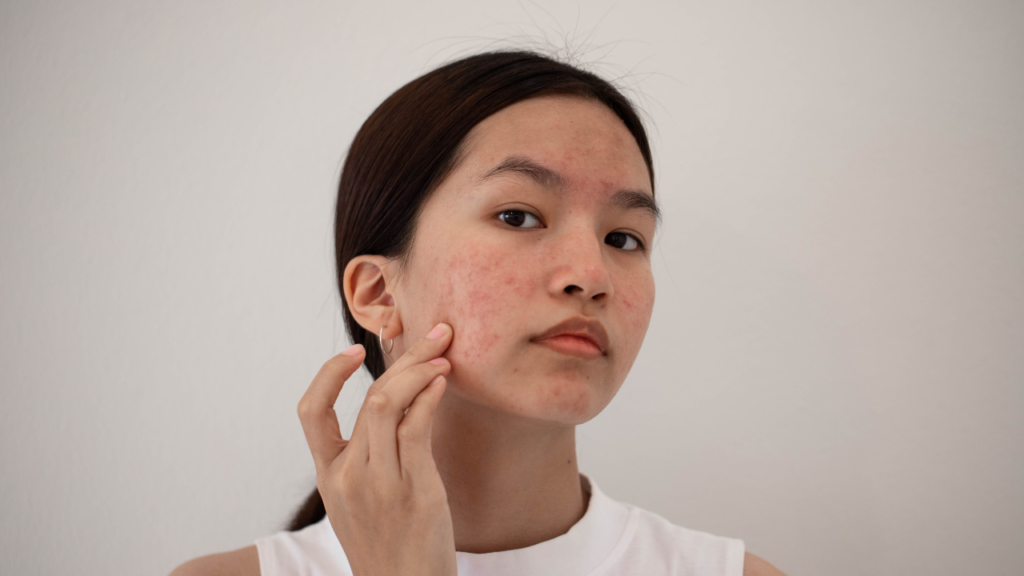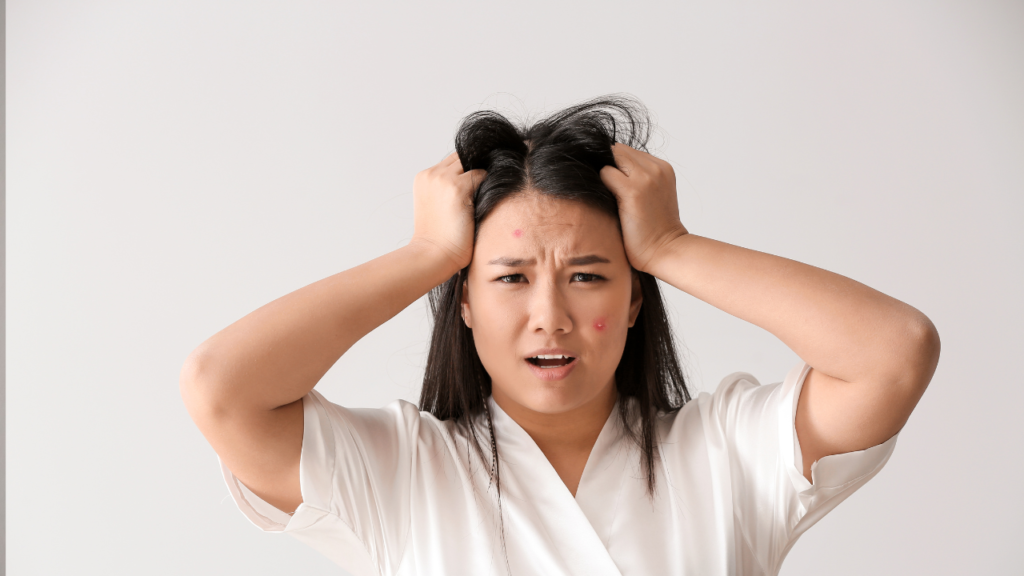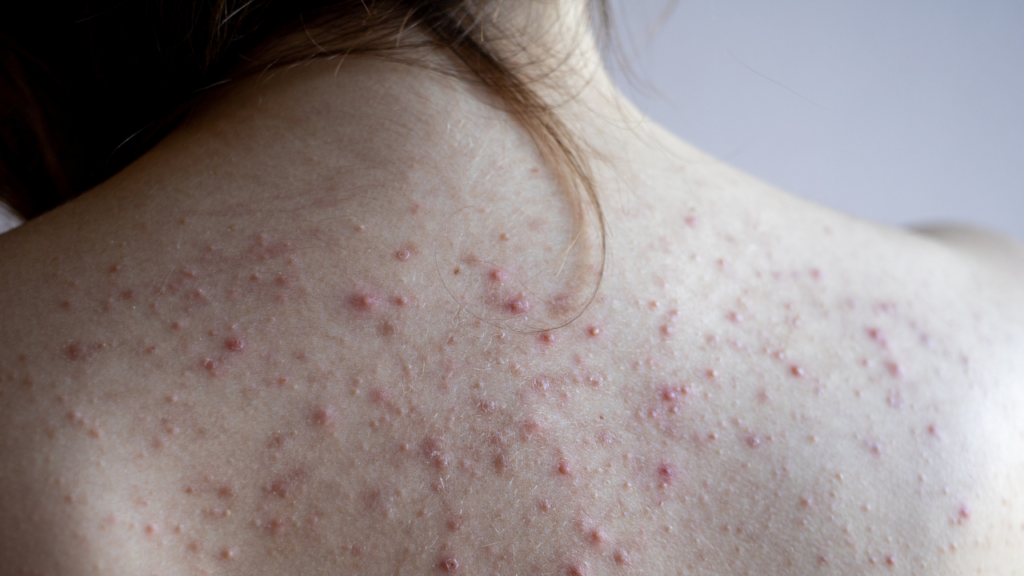
In adulthood, especially in women after puberty, hormonal cystic acne is very common. It resembles usual acne, but it causes whiteheads, blackheads, deeper nodules, and painful cysts on the chin, back, and chest, lasting for long periods of time. Hormonal acne also has a pattern of occurring in flares once a month, two weeks to a couple of days before a woman menstruates. This type of acne causes spots around the mouth, jawline, and chin, and can also be the cause of acne on the whole face, chest back.
Hormonal ace is linked with the overproduction of sebum, which is an oily substance in skin glands that when overproduced, will clog pores trapping bacteria naturally found on the surface of our skin, creating pimples from this bacterial buildup. Fluctuations in hormone production occur throughout various stages of a menstrual cycle and during distinct hormonal periods in a woman’s life, such as perimenopause and menopause contribute to the causes of acne.
Cystic acne can be particularly irritating for adults. When the hormonal roller coaster of puberty finally evens out, facing acne once more can resurrect memories of past challenges, intensifying the annoyance. However, many adults get acne even in their 30s, 40s, or 50s, As we grow up, our bodies go through changes, and sometimes these changes continue into adulthood. Unlike when we first hit puberty and our hormones suddenly increase, in adulthood, it can happen more gradually. This might be because our body is not getting rid of hormones as efficiently, or stress is causing more of certain hormones to be made.
Stress can mess with the hormones that control reproduction. Also, things in our environment can affect how many of these hormones our body makes. Acne may occasionally occur due to some other underlying medical conditions, often digestive-oriented, that can be better treated after the medical condition is diagnosed.
If you’re dealing with stubborn acne or have issues with digestion or skin troubles, we suggest you check out the Confident Hormone Club. It’s a great resource to understand what’s causing your skin or gut issues. You’ll learn about different treatment options like changing your diet, taking supplements, and exploring available medications. Joining the club can help you find the best solution for your concerns.
What is hormonal cystic acne?

The painful, puss-filled inflammatory acne that develops deep under the skin is called cystic acne. It occurs when dead skin cells and overproduction of sebum, clog skin pores, trapping bacteria, and causing inflammation and swelling. Cystic acne is the most severe type of acne likely to cause scarring. Acne is a chronic skin issue that can have negative social, psychological, and emotional impacts.
Researchers studied forty participants with severe acne to understand how severe acne impacts a person’s personality or emotional state They found that these participants tended to be more anxious and worried about their bodies’ appearance for fear of judgement or rejection. They also had lower self-esteem and higher anxiety levels, compared to people without acne.
Twelve of these participants a medicine called isotretinoin to treat their acne, and after a year, they were evaluated for their acne and changes in personality again. The patients’ personalities didn’t change much, but they felt less anxious, although this change wasn’t enough to be specific.
In summary, people with severe acne may experience changes in their personality and emotional well-being. That should be taken into account when treating them, to provide treatment earlier on, and to be more proactive in their effort to resolve acne and heal any scars.
If you’re dealing with symptoms of cystic acne or have scarring from acne, consider joining the Confident Hormone Club. It’s a valuable resource to understand the root causes of acne and scars, as well as how treatments can help support improvement.
Is cystic acne hormonal?
Yes, cystic acne is hormonal, typically involving reproductive hormone fluctuations. Reproductive hormones are dihydrotestosterone (DHT), testosterone, dehydroepiandrosterone sulfate (DHEAS), estradiol or estrogen, and progesterone. Both women and men make these hormones and can experience hormonal or cystic acne because of their fluctuations, however, women endure more fluctuations on a monthly and season-of-life basis, compared to men, which is largely responsible for acne.
Testosterone is a hormone commonly found in males and females. The normal testosterone levels in males typically range between 300 to 1,000 nanograms per deciliter (ng/dL) or 10 to 35 nanomoles per liter (nmol/L). Conversely, females generally exhibit testosterone levels within the range of 15 to 70 ng/dL or 0.5 to 2.4 nmol/L.
It’s important to note that conditions like PCOS, weight gain, and stress can contribute to hormonal fluctuations, which may result in acne. This is largely connected to their influence on insulin resistance. If you want to balance your hormones, including insulin resistance and others linked to acne, join the Confident Hormone Club.
Hormonal Cystic Acne treatment
A natural way to deal with acne involves checking how your hormones are doing. If they’re acting up, we use tools to calm down the androgen receptors so they don’t overstimulate and cause too much sebum, which leads to acne.
When a woman struggles with persistent acne that doesn’t respond to initial treatments, her naturopathic doctor may suggest tests to assess hormone levels and other factors causing inflammation in the body.
Treating cystic acne can be challenging and may require addressing digestive issues. Typically, it takes about three months or three menstrual cycles for the acne to subside, along with additional time for the skin to heal.
How do you stop hormonal cystic acne during ovulation?

Increased levels of both androgens and estrogens during the ovulation and menstrual cycle can accumulate sebum and keratin inside pores (hair follicles). This often results in the appearance of more whiteheads and blackheads. Basically, when there’s too much keratin and sebum on your skin, it becomes a perfect breeding ground for bacteria, which can lead to acne. It either encourages the growth of acne-causing bacteria or traps the ones that are already hanging out on your skin, forming those annoying whiteheads.
So, to tackle acne, it’s a good idea to stay away from foods that feed bacteria or mess with the balance of microorganisms on your face, that can be influenced by your gut health. Also, using things that support your immune system and maintain a healthy balance of microorganisms, along with including certain vitamins and foods that help reduce excessive androgenic hormone production, can be really helpful. Natural methods to alleviate cystic acne outbreaks encompass:
- Limit sugar and refined carbs. They feed bacteria, cause inflammation, and increase sebum production, potentially worsening acne.
- Limit dairy, which is a growth hormone agonist, which can trigger acne from increased stimulation to sebum production. Instead, consider dairy alternatives like goat or soy milk.
- Increasing soluble fiber in your diet can help balance hormones by decreasing blood testosterone levels, potentially reducing hormonal acne.
- Drink 1-3 cups of green tea/day, which contains antioxidants and anti-inflammatory properties that can improve oily skin and reduce acne-related redness. It also contains EGCG (An antioxidant that protects cells from damage and overcomes inflammation), which can help balance hormones.
Can progesterone cause acne?
Yes, progesterone can cause acne. Progesterone is a hormone responsible for the oil production in the skin when you start growing up and developing things like breasts and pubic hair. When you’re pregnant, your progesterone levels go up, and one thing that can happen is getting acne because of the influx of hormones.
Your gastrointestinal and hepatic systems play a crucial role in processing various substances. When the metabolism of hormones in your body is sluggish or slow, it can lead to hormonal fluctuations, contributing to the formation of cystic acne. It is imperative to consider the optimal functioning of your gut and liver for overall hormonal balance and skin health.
What is perimenopause acne?
Perimenopause is the time of natural hormonal fluctuations in the years leading up to menopause. It’s not unusual for women in their early 40s to get acne during this time. The main reason for this acne is that estrogen and progesterone levels naturally begin to decline, which affects the balance of androgens, especially testosterone. When estrogen levels decrease, it leads to increased uptake of cortisol by existing estrogen receptors, subsequently stimulating insulin uptake. This process can trigger inflammation, further worsening acne.
Hormonal acne vs. fungal acne
Fungal acne and hormonal acne are sometimes confused with each other. Because both types of acne begin in hair follicles. Fungal acne happens when too much yeast grows, while hormonal acne is caused by too much oil. Fungal acne can make whiteheads and itchiness and often turns red, irritated, and puffy.

